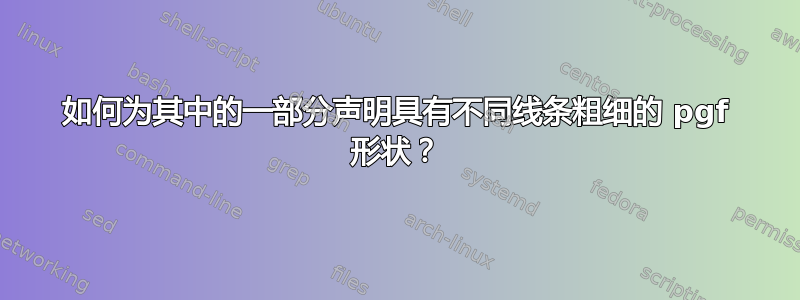
如何更改已声明形状的一部分的线条粗细?我希望它具有其他线条的一半粗细。我尝试\pgfsetlinewidth{0.5\pgflinewidth}在该部分之前添加线条,但没有成功。
\documentclass[tikz]{standalone}
%--------------------------------------------------------
% Packages
%--------------------------------------------------------
\usepackage[T1]{fontenc}
\usepackage[sfdefault]{AlegreyaSans}
\usepackage{bm} % bold math symbols
\usepackage{xcolor}
%--------------------------------------------------------
% Shapes
%--------------------------------------------------------
\makeatletter
\pgfdeclareshape{reg}{
\savedanchor\northeast{%
\pgfmathsetlength\pgf@x{\pgfshapeminwidth}%
\pgfmathsetlength\pgf@y{\pgfshapeminheight}%
\pgf@x=0.5\pgf@x
\pgf@y=0.5\pgf@y
}
% This is redundant, but makes some things easier:
\savedanchor\southwest{%
\pgfmathsetlength\pgf@x{\pgfshapeminwidth}%
\pgfmathsetlength\pgf@y{\pgfshapeminheight}%
\pgf@x=-0.5\pgf@x
\pgf@y=-0.5\pgf@y
}
\inheritanchorborder[from=rectangle]
% Define same anchor a normal rectangle has
\anchor{center}{\pgfpointorigin}
\anchor{north}{\northeast \pgf@x=0pt}
\anchor{east}{\northeast \pgf@y=0pt}
\anchor{south}{\southwest \pgf@x=0pt}
\anchor{west}{\southwest \pgf@y=0pt}
\anchor{north east}{\northeast}
\anchor{north west}{\northeast \pgf@x=-\pgf@x}
\anchor{south west}{\southwest}
\anchor{south east}{\southwest \pgf@x=-\pgf@x}
\anchor{text}{
\pgfpointorigin
\advance\pgf@x by -.5\wd\pgfnodeparttextbox%
\advance\pgf@y by -.5\ht\pgfnodeparttextbox%
\advance\pgf@y by +.5\dp\pgfnodeparttextbox%
}
%Port Anchors
\anchor{CLK}{
\pgf@process{\northeast}%
\pgf@x=-1\pgf@x%
\pgf@y=-.6\pgf@y%
}
% Draw the Rectangle box and the port labels
\backgroundpath{
% Rectangle box
\pgfpathrectanglecorners{\southwest}{\northeast}
\begingroup
%TODO: need to change thickness for this part
\pgf@anchor@reg@CLK
\pgf@xa=\pgf@x \pgf@ya=\pgf@y
\pgf@xb=\pgf@x \pgf@yb=\pgf@y
\pgf@xc=\pgf@x \pgf@yc=\pgf@y
\pgfmathsetlength\pgf@x{1.8ex} % size depends on font size
\advance\pgf@ya by \pgf@x
\advance\pgf@xb by \pgf@x
\advance\pgf@yc by -\pgf@x
\pgfpathmoveto{\pgfpoint{\pgf@xa}{\pgf@ya}}
\pgfpathlineto{\pgfpoint{\pgf@xb}{\pgf@yb}}
\pgfpathlineto{\pgfpoint{\pgf@xc}{\pgf@yc}}
\pgfclosepath
\endgroup
}
}
\makeatother
%--------------------------------------------------------
% Shape configuration
%--------------------------------------------------------
\tikzset{every reg node/.style={draw,minimum width=1cm,minimum height=2cm,pin font=\small,ultra thick,inner sep=1mm,outer sep=0mm}}
%--------------------------------------------------------
% Begin Document
%--------------------------------------------------------
\begin{document}
\begin{tikzpicture}
\node[shape=reg] (r1) at (0,0) {};
\end{tikzpicture}
\end{document}
答案1
我搞明白了。我用过\pgfusepath{stroke}。它的工作原理与 html 画布描边非常相似。
\documentclass[tikz]{standalone}
%--------------------------------------------------------
% Packages
%--------------------------------------------------------
\usepackage[T1]{fontenc}
\usepackage[sfdefault]{AlegreyaSans}
\usepackage{bm} % bold math symbols
\usepackage{xcolor}
%--------------------------------------------------------
% Shapes
%--------------------------------------------------------
\makeatletter
\pgfkeys{/tikz/pin font/.store in=\pinfont}
\pgfkeys{/tikz/pin color/.store in=\pincolor}
\pgfdeclareshape{reg}{
\savedanchor\northeast{%
\pgfmathsetlength\pgf@x{\pgfshapeminwidth}%
\pgfmathsetlength\pgf@y{\pgfshapeminheight}%
\pgf@x=0.5\pgf@x
\pgf@y=0.5\pgf@y
}
% This is redundant, but makes some things easier:
\savedanchor\southwest{%
\pgfmathsetlength\pgf@x{\pgfshapeminwidth}%
\pgfmathsetlength\pgf@y{\pgfshapeminheight}%
\pgf@x=-0.5\pgf@x
\pgf@y=-0.5\pgf@y
}
\inheritanchorborder[from=rectangle]
% Define same anchor a normal rectangle has
\anchor{center}{\pgfpointorigin}
\anchor{north}{\northeast \pgf@x=0pt}
\anchor{east}{\northeast \pgf@y=0pt}
\anchor{south}{\southwest \pgf@x=0pt}
\anchor{west}{\southwest \pgf@y=0pt}
\anchor{north east}{\northeast}
\anchor{north west}{\northeast \pgf@x=-\pgf@x}
\anchor{south west}{\southwest}
\anchor{south east}{\southwest \pgf@x=-\pgf@x}
\anchor{text}{
\pgfpointorigin
\advance\pgf@x by -.5\wd\pgfnodeparttextbox%
\advance\pgf@y by -.5\ht\pgfnodeparttextbox%
\advance\pgf@y by +.5\dp\pgfnodeparttextbox%
}
%Port Anchors
\anchor{CLK}{
\pgf@process{\northeast}%
\pgf@x=-1\pgf@x%
\pgf@y=-.6\pgf@y%
}
% Draw the Rectangle box and the port labels
\backgroundpath{
%save default linewidth
\pgfmathsetlength\pgf@xd{\pgflinewidth}
\pgfsetlinewidth{\pgf@xd}
% Rectangle box
\pgfpathrectanglecorners{\southwest}{\northeast}
\pgfusepath{stroke} % draw rectangle at default linewidth
\pgfsetlinewidth{.5\pgf@xd} % set linewidth to 50% default linewidth
\begingroup
\pgf@anchor@reg@CLK
\pgf@xa=\pgf@x \pgf@ya=\pgf@y
\pgf@xb=\pgf@x \pgf@yb=\pgf@y
\pgf@xc=\pgf@x \pgf@yc=\pgf@y
\pgfmathsetlength\pgf@x{1.8ex} % size depends on font size
\advance\pgf@ya by \pgf@x
\advance\pgf@xb by \pgf@x
\advance\pgf@yc by -\pgf@x
\pgfpathmoveto{\pgfpoint{\pgf@xa}{\pgf@ya}}
\pgfpathlineto{\pgfpoint{\pgf@xb}{\pgf@yb}}
\pgfpathlineto{\pgfpoint{\pgf@xc}{\pgf@yc}}
\pgfclosepath
\endgroup
\pgfusepath{stroke} % draw triangle at 50% default linewidth
\pgfsetlinewidth{\pgf@xd} % reset to default linewidth
}
}
\makeatother
%--------------------------------------------------------
% Shape configuration
%--------------------------------------------------------
\tikzset{every reg node/.style={draw,minimum width=1cm,minimum height=2cm,pin font=\small,ultra thick,inner sep=1mm,outer sep=0mm}}
%--------------------------------------------------------
% Begin Document
%--------------------------------------------------------
\begin{document}
\begin{tikzpicture}
\node[shape=reg] (r1) at (0,0) {};
\node[shape=reg] (r2) at (2,0) {};
\end{tikzpicture}
\end{document}




